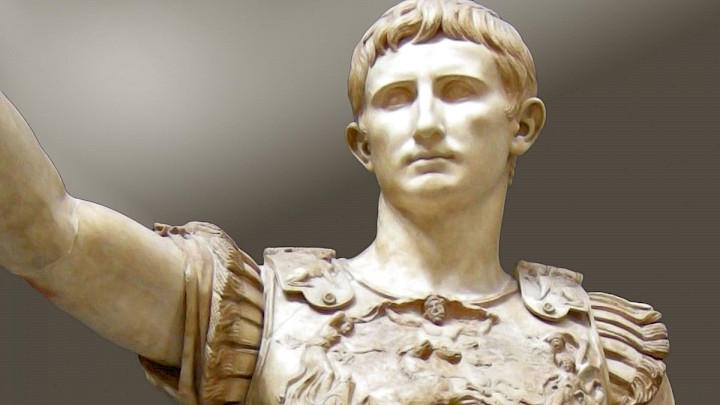
To listen to this reflection as a podcast, click here.
Powerful leaders tend to admire other powerful leaders.
In an interview with the New Yorker a few years ago, Mark Zuckerberg, founder and CEO of Facebook (now known as Meta), and one of the richest men in the world, acknowledged his fascination with one of history’s most famous dictators. The Silicon Valley superstar admires Caesar Augustus (63 BC – AD 14), under whose iron fist the Roman Empire came to dominate the ancient Western world.
As a student, Zuckerberg loved studying Latin. He remembers it as being “very much like coding.” He and his wife, Priscilla Chan, named their sons Maxima and August. And his haircut? It’s just possible he’s been to the same barber as some of the guys depicted by first century Roman busts.
Zuckerberg observes, “Basically, through a really harsh approach, [Augustus] established 200 years of world peace. What are the tradeoffs in that? On the one hand, world peace is a long-term goal that people talk about today….” On the other hand, of course, “that didn’t come for free, and he had to do certain things.”
He had to do certain things.
That’s the rub. Those “certain things” included crushing anyone and anything that stood in his way. The New Yorker seemed aware that that might signify a major concern, since it titled its profile, “Can Mark Zuckerberg fix Facebook before it breaks democracy?”
The name Caesar Augustus rings a bell for students of the Bible because he was on the throne when a certain baby was born to a Jewish peasant girl in the village of Bethlehem.
Born Gaius Octavianus, he was the adopted son and successor of Julius Caesar. When he initially came to power at the age of 32, he presented himself as a champion of representative government – First Citizen of the old Roman Republic.
But it quickly became apparent he would rule as a committee of one. He renamed himself Caesar Augustus (“the Exalted One”), and made it clear his rivals would never get a sniff of his authority or acclaim.
The historian Thomas Cahill asserts that Augustus displayed all the hallmarks of a ruthless dictator. He was “a politician of labyrinthine cunning, difficult, delusional, and cruel.” Those who knew him either hated him or feared him. Or both.
All things considered, he proved to be a superb administrator. He expanded the borders of the empire and established important new cities. His reign marked the beginning of the so-called Pax Romana, the 200-year period of relative peace so admired by Mark Zuckerberg. As the Roman historian Tacitus observed, however, the Roman definition of peace was the stillness that came after complete destruction. Solitudinem faciunt, pacem appellant: “They make a desert and call it peace.”
He commissioned a statue of himself in the Roman forum that was 11 times the size of a normal human being. After all, he was not a normal human being. He was divine. Like all gods, he should be worshiped.
Jesus was born into Augustus’ world. For something like the first 19 years of his life, he lived under the authority of an autocrat who lived 1,500 miles away.
But in a twist that would have seemed incomprehensible to the emperor, it would turn out that Augustus was actually living in Jesus’ world. He just didn’t know it.
Today the only thing that remains of Augustus’ fabulous statue is a single finger. It’s currently on display in the Forum of Rome. The name “Caesar” adorns pizza franchises, a creamy salad dressing, casinos, a popular sports gambling app promoted by Peyton and Eli Manning, and not a few pet dogs. But that’s about it.
On his deathbed, Augustus uttered the words, “Have I played the part well? Then applaud as I exit.” All the way to the end, he was quite taken with himself.
He must have found it unusually satisfying to die in the middle of August, since the Roman Senate had literally named the month after him.
But it would have been jarring for him to realize that future ages would never find out, nor even care, that he died in the year 767 A.U.C. (Ab Urbe Condita, “from the founding of the City”) – the Roman way of reckoning the passing of time. Instead, children would be taught that he died on August 19, A.D. 14 (Anno Domini, “in the year of the Lord”) – all because of some Nobody from Nowheresville whose birth he could not possibly have noticed.
But that’s what happens to “great people” – if not in this world, then certainly in the next. “The first shall be last, and the last shall be first,” according to Jesus in Matthew 20:15-16.
Human beings are just the kind of creatures who tend to look up to others as leaders, mentors, and heroes.
Most of us have childhood memories of thinking about a great athlete or a movie star or a superhero or a favorite teacher, “If only I could be him,” or, “I want to grow up and be just like her.” The objects of our admiration and fascination are likely to change as we grow older. But it matters whom we regard right now as truly great, and whom we have determined is living the life we’ve always wanted.
Should we imitate the person who seems to have the looks, the power, the influence, and the bank account to do whatever he or she wants?
Or should we align ourselves with the One who is convinced that humility is the deepest wisdom, that servanthood is true leadership, and that love is the only way that the world can ever be changed for the better?
Choose this day whom you think is the true king of the world.
Choose wisely.
